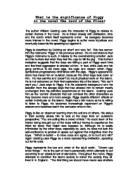in the novel The Lord of the Flies?
The author William Golding uses the character of Piggy to relates to certain themes in the novel. He is linked closely with civilisation, time and the conch which itself represents order. As savagery becomes more intense in the novel, Piggy begins to suffer more injustices and eventually loses his life speaking out against it.
Piggy is described by Golding as 'short' and very 'fat'. This has earned him the nickname 'Piggy' in his previous school. It's no coincidence that Piggy's nickname is such, it relates to the overwhelming emotion Jack and his hunters feel when they feel the urge to 'kill the pig'. This indirect metaphor suggests that the boys are killing a part of Piggy each time and that their aggression is directed at him. In fact, while Jack and his gang continue to kill more pigs, the logic and reason which Piggy symbolizes progressively diminishes with the pigs. Piggy's appearance alone has made him an outsider, because the other boys look down on him. He has asmtha and doesn't do much physical work on the island. He is not welcomed on their first exploratory trip of the island. "We don't want you," Jack says to Piggy. It is his academic background and his isolation from the savage boys that had allowed him to remain mostly unchanged from his primitive experiences on the island. Golding uses him as the 'control' character that can contrast the other characters as they become more and more savage. Piggy depicts different effects on certain individuals on the island. Ralph has a fair nature as he is willing to listen to Piggy. He becomes increasingly dependent on Piggy's wisdom and becomes lost in the confusion around him.

This is a preview of the whole essay
Peer Reviews
Here's what a star student thought of this essay
Quality of writing
The Quality of Written Communication is very good. No major errors that would compromise the clarity of the essay are made, and their is no reason to penalise the candidate for problems with spelling, grammar and/punctuation as all are kept well in check throughout the answer.
Level of analysis
The Level of Analysis is good and attacks the complexity of a character like Piggy well. It discusses the purpose of Piggy within the novel, his relationships with the other characters (some very specific comments with regard to Ralph - perhaps more could be written with regard to his relationship with Jack though), and overall feels like the candidate has sensitively appreciated the value of the character to the novel as the intelligent, rational-thinker. I would say the candidate missed something quite obvious in that Piggy's glasses are a symbol of visual clarity - being able to, as they correctly identify, see things from an objective outsider's perspective. They are also in line with his intelligence and insight.
Response to question
This is an excellent essay. There is very adept insight into the character of Piggy and the allegorical resonance Golding created him with. There is excellent focus on Piggy's role within the book and the society of boys living on the island, and a good understanding of how his mistreatment allows him to sit outside the group and observe. He is much like Ralph, but the crucial differences are correctly identified here, as Ralph is more active and more respected due to a higher state of social comfortability. Where I think the candidate could improve is drawing comparison to Simon. Simon and Piggy are really the only two that remain permanently untouched by the innate evil within all men (the central theme of Golding's novel), and yet Golding drives this theme home by writing that Simon and Piggy are both killed at the hands of this initial judgement and ostracisation and ultimately the animalistic savagery the soon developed once civilisation had collapsed.







